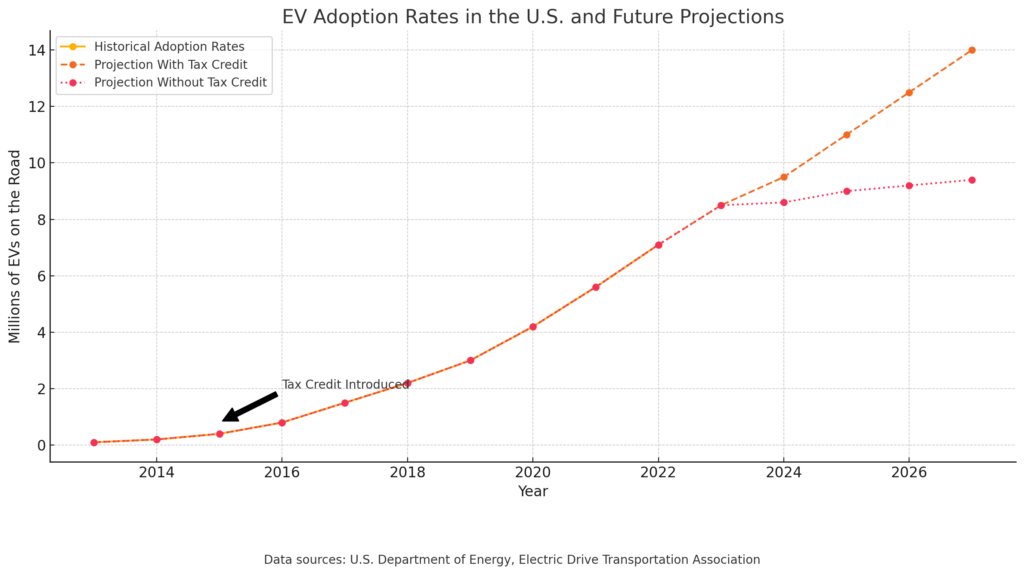The landscape of electric vehicles (EVs) in the United States is at a crossroads, and a critical decision by President-elect Donald Trump could dramatically reshape its trajectory. The $7,500 federal tax credit for EV buyers, a key incentive driving the transition to clean energy, is reportedly on the chopping block. This proposal has sparked debates across political, environmental, and economic spheres. For a country striving to lead in the global EV race, the implications are profound, touching everything from consumer behavior to the competitive edge of American automakers.
The $7,500 tax credit has been a cornerstone of EV adoption since its inception. For many consumers, it has bridged the gap between the upfront costs of electric vehicles and their internal combustion engine counterparts. While EV prices have steadily decreased thanks to advancements in battery technology, the tax credit has played a vital role in accelerating this shift. Without it, the affordability of electric cars for middle-class families could take a hit, potentially stalling the EV revolution.
Why does this matter? It’s not just about saving money on gas or embracing the next big thing in automotive technology. EVs represent a pivotal piece of the puzzle in combating climate change. The transportation sector accounts for nearly 30% of greenhouse gas emissions in the U.S., and the widespread adoption of electric vehicles is a necessary step toward meeting national and international climate goals. Eliminating the tax credit could undermine progress at a time when global competitors like China are doubling down on EV subsidies and infrastructure.

Automakers are understandably concerned. Major players like Ford, General Motors, and Tesla have spent billions pivoting toward electric models. The credit has been a crucial factor in justifying these investments, as it fosters consumer demand. The Alliance for Automotive Innovation, representing these companies, has been vocal in urging the Trump administration to maintain the credit. In an open letter, they argued that removing this incentive would hinder the industry’s ability to compete globally and could jeopardize thousands of jobs tied to the burgeoning EV supply chain.
Interestingly, Elon Musk, CEO of Tesla, has taken a nuanced stance on this issue. While Tesla has benefited immensely from the tax credit, Musk has previously stated that his company could thrive without it. He contends that Tesla’s market position and brand loyalty make it less reliant on subsidies compared to legacy automakers still establishing their electric lineups. However, Musk’s confidence is not necessarily indicative of the industry at large. Smaller EV startups and companies in the early stages of electrification could face significant challenges without government support.
For consumers, the potential rollback of the tax credit introduces uncertainty. Many buyers in the market for an EV may feel pressure to finalize their purchase before any policy changes take effect. This urgency could temporarily boost sales but might lead to a drop-off once the credit is officially rescinded. The psychological impact of losing the incentive—whether or not it truly affects the long-term cost of ownership—could deter potential buyers who perceive EVs as less financially appealing.
Economically, the proposed elimination of the credit aligns with President-elect Trump’s broader agenda of reducing government spending and deregulation. While these goals may resonate with certain constituencies, they conflict with the broader global trend of investing in clean energy technologies. Countries like China and Germany are pouring resources into EV adoption, recognizing it as a strategic industry for the 21st century. By stepping back from such incentives, the U.S. risks falling behind in what many see as the future of transportation.
The environmental ramifications are equally troubling. According to the Environmental Protection Agency (EPA), electric vehicles produce significantly lower emissions over their lifetime compared to gasoline-powered cars, even when accounting for the electricity generation mix. Scaling EV adoption is crucial for reducing air pollution and meeting the commitments outlined in the Paris Agreement. Without the tax credit, achieving these goals could become considerably more difficult.
Critics of the tax credit argue that it disproportionately benefits wealthier individuals who can afford the high upfront costs of EVs. While there’s some truth to this claim, data from the Department of Energy suggests that the credit has also spurred innovation and price reductions that benefit all consumers over time. The early adoption facilitated by incentives creates economies of scale, driving down production costs and making EVs more accessible in the long run.
The debate also extends beyond consumer vehicles. The $7,500 tax credit is part of a broader ecosystem of policies aimed at decarbonizing transportation. Public transit, electric buses, and fleet vehicles also rely on government support to transition to cleaner energy sources. Rolling back the credit could set a precedent that impacts these complementary efforts, slowing progress across the board.
Some industry analysts believe that eliminating the credit might encourage automakers to innovate faster, developing cheaper EV models to maintain consumer interest. While this perspective has merit, it overlooks the financial and logistical challenges of scaling up production without predictable demand. The credit has provided a safety net, allowing companies to invest in R&D with some assurance that consumers will follow.
For those invested in the future of electric mobility, this moment is a call to action. The potential rollback of the tax credit underscores the importance of grassroots advocacy, consumer education, and innovative policy solutions. As the industry evolves, new approaches—such as state-level incentives, carbon taxes, or infrastructure investments—could fill the gap left by federal policies.
In the coming months, all eyes will be on the Trump administration and Congress as they navigate this contentious issue. The decision will not only shape the future of electric vehicles in America but also signal the country’s commitment—or lack thereof—to leading the global transition to clean energy. For EV enthusiasts, environmental advocates, and forward-thinking automakers, the stakes have never been higher.
To explore more about EV tax credits, check out “Strategic Power Play: Is Musk Targeting the EV Tax Credit to Gain Leverage in China?” From breaking news to in-depth analyses of technology and policy, EVGeek.com is your go-to source for all things EV.



